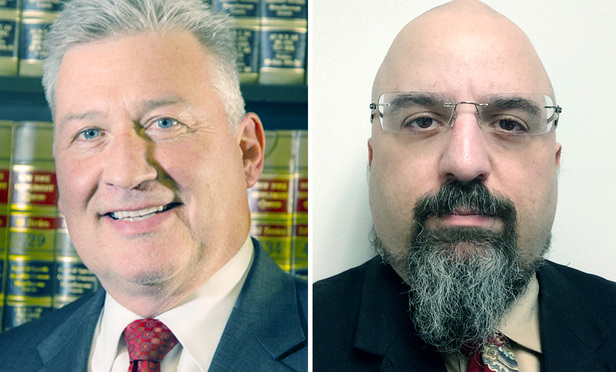Kevin G. Faley

September 07, 2017 | New York Law Journal
Capacity of Infants to TestifyAndrea M. Alonso and Kevin G. Faley discuss cases illustrative of the determination a court makes in weighing whether to accept a child's testimony.
By Andrea M. Alonso and Kevin G. Faley
8 minute read

July 26, 2017 | New York Law Journal
Settlement Techniques: High-Low AgreementsAndrea M. Alonso and Kevin G. Faley write: High-low agreements in tort cases are underutilized and often misunderstood, but they are an effective way to prevent a runaway verdict with potential exposure of personal and corporate assets while guaranteeing plaintiff a recovery in the event of a defense verdict.
By Andrea M. Alonso and Kevin G. Faley
16 minute read

June 13, 2017 | New York Law Journal
The 'Creation Exception' to the Pothole Law: Difficult to ProveKevin G. Faley and Kenneth E. Pitcoff write that the Court of Appeals has recognized only two exceptions to the statutory requirement of prior written notice of roadway and sidewalk defects, the first of which is where the locality created the defect through an affirmative act of negligence, which is limited to work that immediately results in a dangerous condition. Two recent cases clarified what is necessary to defeat a claim of immediate creation of a dangerous condition.
By Kevin G. Faley and Kenneth E. Pitcoff
7 minute read

May 25, 2017 | New York Law Journal
The Elevation of the ExpertAndrea M. Alonso and Kevin G. Faley write: On March 30, the Court of Appeals decided 'O'Brien v. Port Authority,' a case where two experts disagreed on whether a temporary metal staircase or scaffold—a safety device under the Labor Law—provided proper protection as required by the statute.
By Andrea M. Alonso and Kevin G. Faley
16 minute read

March 31, 2017 | New York Law Journal
Traumatic Brain Injury as a 'Grave Injury': An Examination of 'Rubeis' and Its ProgenyKevin G. Faley and Christopher R. Invidiata discuss the grave injury threshold of the Workers Compensation Law, writing: The courts are not finders of fact, nor are they generally permitted to make subjective assessments of a witness' abilities. An objective assessment of a claimant's absolute employability provides a clear bright-line rule upon which the courts may rely. The prior subjective approach effectively mandated a jury trial in many traumatic brain injury matters which otherwise could be disposed of as a matter of law.
By Kevin G. Faley and Christopher R. Invidiata
21 minute read

September 07, 2016 | New York Law Journal
Hazard Vehicles: When Does Reckless Disregard Standard Apply?Kenneth E. Pitcoff and Kevin G. Faley write: Some might be surprised to discover just how much protection is afforded to those who operate hazard vehicles, such as street sweepers and snowplows—even more than that provided to police vehicles and ambulances. Recently, courts have continued to expand protections for these hazard vehicles by broadening the interpretation of the "actually engaged in work" language and liberally interpreting what behavior should be considered reckless.
By Kenneth E. Pitcoff and Kevin G. Faley
21 minute read

June 02, 2016 | New York Law Journal
When Same-Sex Harassment Creates a Hostile Work EnvironmentKenneth E. Pitcoff and Kevin G. Faley write that the U.S. Supreme Court in 1998 made clear that a sex discrimination claim is not barred because the plaintiff and the harasser are members of the same sex, and provided three routes that create inferences of discrimination "because of…sex" in such circumstances. Every circuit has determined that those routes are not exhaustive, but their analysis of the "because of…sex" and "severe and pervasive" requirements are diverse.
By Kenneth E. Pitcoff and Kevin G. Faley
22 minute read

April 29, 2016 | New York Law Journal
Insurance Claims Files: How Privileged Are They?Andrea M. Alonso and Kevin G. Faley write that claims files are the hard-drive of an insurance carrier, with a record of all information about a claim: opinions, discovery, reserves, witness statements, etc. Insurance claims files are, in theory, protected from discovery by work-product doctrine as "material prepared in anticipation of litigation." But these protections are situational.
By Andrea M. Alonso and Kevin G. Faley
24 minute read

March 21, 2016 | New York Law Journal
Proper Objections at a Personal Injury DepositionKevin G. Faley and Andrea M. Alonso discuss the four main categories of questions which an attorney can instruct his client in a personal injury action not to answer: the palpably improper or irrelevant question; privileged communications; a defendant-physician's opinion of co-defendant's alleged medical malpractice; and questions that run afoul of the right against self-incrimination.
By Kevin G. Faley and Andrea M. Alonso
24 minute read

February 18, 2016 | New York Law Journal
Priority of Insurance in Construction AccidentsKevin G. Faley and Andrea M. Alonso write: It is a common occurrence for multiple insurance policies to be applicable in a personal injury suit resulting from an accident on a construction site. Often both primary and excess policies contain conflicting language, have similar priority designations and provide coverage to several parties. Determining the priority of insurance coverage can be a complicated yet important task.
By Kevin G. Faley and Andrea M. Alonso
12 minute read
Trending Stories
- 1Gibson Dunn Sued By Crypto Client After Lateral Hire Causes Conflict of Interest
- 2Trump's Solicitor General Expected to 'Flip' Prelogar's Positions at Supreme Court
- 3Pharmacy Lawyers See Promise in NY Regulator's Curbs on PBM Industry
- 4Outgoing USPTO Director Kathi Vidal: ‘We All Want the Country to Be in a Better Place’
- 5Supreme Court Will Review Constitutionality Of FCC's Universal Service Fund
More from ALM
- Legal Speak at General Counsel Conference East 2024: Match Group's Katie Dugan & Herrick's Carol Goodman 1 minute read
- Legal Speak at General Counsel Conference East 2024: Eric Wall, Executive VP, Syllo 1 minute read
- Legal Speak at General Counsel Conference East 2024: Virginia Griffith, Director of Business Development at OutsideGC 1 minute read



